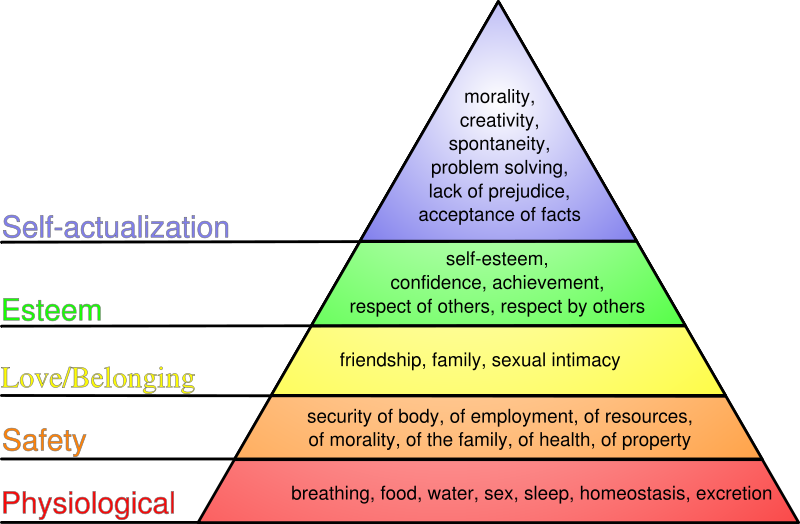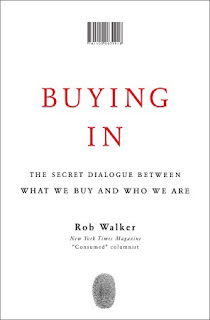Just about to finish reading "Buying In - What we buy and Who we are" by Rob Walker. I good read for anyone that is involved in selling stuff to consumers through branding and marketing efforts. It goes further than a previous book I read about consumer traits (Spent - Geoffrey Millar) and how we buy stuff to show off our individual personalities through evolutionary trait display. This book takes a slightly different view that suggest that we buy stuff more to support our internal narrative about ourselves, and not necessarily about showing off to others.
Lot's of great examples and arguments that support the concept. Found it to be an easy read and insightful. Observations of the current consumer space and the issues that today's marketing has to contend with compared to more traditional approaches. I think some very powerful ideas are put forward about branding and how people are not so much resisting branding but more about adopting the concepts and language of branding to support their own internal self fulfillment, as suggested on Maslow's heirarchy of needs.
Branding is a big focus in the book and definitely it makes you appreciate the power of the branding language, and how much is now part of our culture. It is fascinating how it has become something that we can take part in and add to the conversations, rather than resist as Naomi Klein suggest in her book " No Logo". Brands are being embraced rather than repelled by today's consumers and especially among the youth and new start ups. The main take away message from the book is really that consumer behavior today is and always has been about our stories we tell ourselves, it is about who we are and what we believe, branding is part of that story telling process and is being used as such by today's consumers not rejected.
Showing posts with label Individual. Show all posts
Showing posts with label Individual. Show all posts
Thursday, February 2, 2012
Saturday, January 28, 2012
Maslow's Hierarchy of Needs
Most of our decisions are a result of intrinsic motivations that we have through our day to day life. Some we are aware of and many appear to affect us on a deep unconscious level. These motivations and needs can be the desire to eat and be healthy, to the desire to look good and be accepted by our peers. In 1943 Abraham Maslow proposed a theory of human motivation that he placed into a hierarchy with basic physiological needs such as breathing, food and water that are needed for survival at the bottom of the structure to self actualization, and self esteem at the top.

This diagram can prove helpful in understanding the importance of motivation when making decisions for a given situation. The real value for design in this diagram is that when planning a new product or promotional piece, then you are more able to think clearly about what needs you may be addressing and how important they are to the individual. Very often you want a new product to solve a particular problem, and that may be a motivation lower on the needs hierarchy suggesting it is fundamental desire of many to be healthy for example, but then you want to attach aspiration imagery and language that appeals to a higher need for a product to allow the user to achieve a higher level of creativity or self esteem. The concepts Maslow put forward are guides to the things that are important to us, after the basic needs are met it is important to understand the importance of the higher needs for us to ultimately become more self fulfilled and reach a transcendent state of being. The goal of reaching all that you can be is the concept in this diagram, once all things lower in the hierarchy are resolved then you can become yourself. The concept has received criticism about being very ethnocentric, as it doesn't express the differences of social and intellectual needs for those born into individualistic society and those raised in a collectivist society, where the acceptance and community will outweigh the needs for freedom and individuality. It is most definitely about the individual, which makes sense considering Maslow was from the United States and lived in an individualistic society. None the less it does give a insight into some motivations of people and especially consumers from many parts of the World that are mostly looking for self fulfillment. The flow from survival, comfort and psychological needs into self actualization and transcendence is an important part of understanding the motivations we have in given situations, it also goes a long way to explaining some of our habits and how external influences can affect our decisions. Also, as you browse the hierarchy of the diagram, you see how friendship, family and respect have lead to such social networking sites as facebook and twitter not to mention how blogging itself is helping in our need for creativity and self actualization.
Manfred Max-Neef argued against this concept and put forward an extension of human needs that looks more like this table below, Max-Neef believed that there is no hierarchy of needs but rather trade offs towards satisfaction. He also suggested that our needs are few, finite and classifiable and not like Maslow whose hierarchy suggests the needs are infinite and insatiable. Max-Neef argues that poverty for example, may result from any of these needs being denied or unfulfilled.
| Need | Being (qualities) | Having (things) | Doing (actions) | Interacting (settings) |
|---|---|---|---|---|
| subsistence | physical and mental health | food, shelter, work | feed, clothe, rest, work | living environment, social setting |
| protection | care, adaptability, autonomy | social security, health systems, work | co-operate, plan, take care of, help | social environment, dwelling |
| affection | respect, sense of humour, generosity, sensuality | friendships, family, relationships with nature | share, take care of, make love, express emotions | privacy, intimate spaces of togetherness |
| understanding | critical capacity, curiosity, intuition | literature, teachers, policies, educational | analyse, study, meditate, investigate, | schools, families, universities, communities, |
| participation | receptiveness, dedication, sense of humour | responsibilities, duties, work, rights | cooperate, dissent, express opinions | associations, parties, churches, neighbourhoods |
| leisure | imagination, tranquillity, spontaneity | games, parties, peace of mind | day-dream, remember, relax, have fun | landscapes, intimate spaces, places to be alone |
| creation | imagination, boldness, inventiveness, curiosity | abilities, skills, work, techniques | invent, build, design, work, compose, interpret | spaces for expression, workshops, audiences |
| identity | sense of belonging, self-esteem, consistency | language, religions, work, customs, values, norms | get to know oneself, grow, commit oneself | places one belongs to, everyday settings |
| freedom | autonomy, passion, self-esteem, open-mindedness | equal rights | dissent, choose, run risks, develop awareness | anywhere |
Subscribe to:
Posts (Atom)

